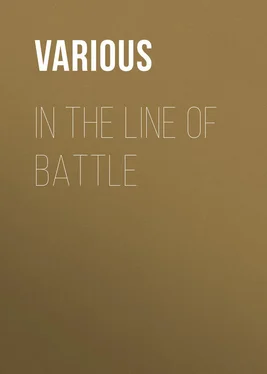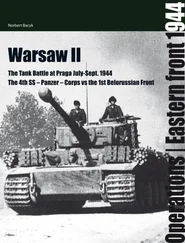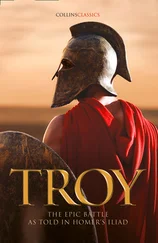Various - In the Line of Battle
Здесь есть возможность читать онлайн «Various - In the Line of Battle» — ознакомительный отрывок электронной книги совершенно бесплатно, а после прочтения отрывка купить полную версию. В некоторых случаях можно слушать аудио, скачать через торрент в формате fb2 и присутствует краткое содержание. Жанр: История, prose_military, Биографии и Мемуары, на английском языке. Описание произведения, (предисловие) а так же отзывы посетителей доступны на портале библиотеки ЛибКат.
- Название:In the Line of Battle
- Автор:
- Жанр:
- Год:неизвестен
- ISBN:нет данных
- Рейтинг книги:4 / 5. Голосов: 1
-
Избранное:Добавить в избранное
- Отзывы:
-
Ваша оценка:
- 80
- 1
- 2
- 3
- 4
- 5
In the Line of Battle: краткое содержание, описание и аннотация
Предлагаем к чтению аннотацию, описание, краткое содержание или предисловие (зависит от того, что написал сам автор книги «In the Line of Battle»). Если вы не нашли необходимую информацию о книге — напишите в комментариях, мы постараемся отыскать её.
In the Line of Battle — читать онлайн ознакомительный отрывок
Ниже представлен текст книги, разбитый по страницам. Система сохранения места последней прочитанной страницы, позволяет с удобством читать онлайн бесплатно книгу «In the Line of Battle», без необходимости каждый раз заново искать на чём Вы остановились. Поставьте закладку, и сможете в любой момент перейти на страницу, на которой закончили чтение.
Интервал:
Закладка:
When we had crossed the Aisne and had got into the hills we had grown wary, and in crossing fields and open spaces we went in artillery formation, or “blobbing,” as it is called. This “blobbing” was a splendid way of saving the lives of men when we were under fire, for it kept us in platoons closed, but 200 yards between each platoon, and so enabled us to escape a good many of the bursting shells.
We went along a whole stretch of country till we reached a small village and billeted there. In the morning we were on the move again, driving the Germans from one crest to another, but their position was too strong for us to shift them any farther, and then it was a long monotonous job of hanging on and waiting. They are practically in the same place now.
We did a lot of bayonet work from time to time; but I can’t say much about it. I know that in one affair I saw a German. I stuck and he stuck – and I don’t remember any more – one goes insane. I got a bang on the back of the head from somebody, though I thought at the time that a stone had been thrown and had struck me. I remember that day well – September 14th – because in addition to the charge I saw a Jack Johnson for the first time, though we christened them Black Marias and Coal-boxes then. This monster burst amongst some French Algerian troops, and shot a lot of them up into the air, literally blowing the poor devils to pieces.
On October 19th we marched away and moved by train, finally getting to Ypres. We dug trenches in a ditch on the night of the 22nd and occupied them, and on the morning of the 23rd I went on outpost duty, little dreaming of the fate that was in store for me. At that time shells were dropping very heavily between our line of trenches and a village not far away which was supposed to be occupied by the French.
It was about six o’clock in the morning when I went out with my patrol, of which I was corporal in charge. There were four of us altogether, and we were put on outpost duty in what proved to be a very warm corner. The shelling went on all day, and we were looking forward to our relief; but it did not happen to come, and so we had to hold on. The day passed and the night came, and it was not long after darkness that we knew that a strong rush was being made on us by the enemy – they proved to be the 213th Landwehr Battalion of Prussian Infantry.
I saw that we were being rushed, and I knew that our chance of escape was hopeless. I thought very swiftly just then, and my thought was, “We can’t get away, so we may as well stick it. If we bolt we shall be shot in the back – and we might just as well be shot in the front; it looks better.”
They were on us before we knew where we were, and to make matters worse, they rushed upon us from the direction of the village where we supposed the French to be.
There was a scrap, short and sweet, between our outpost and the Germans, and almost in the twinkling of an eye, it seemed, two of my men were killed, one got away, and I was wounded and captured.
A bullet struck me in the right arm and I fell down, and the Germans were on me before I knew what was happening. I still had my equipment on, and to this fact and the prompt kind act of a wounded German – let us be fair and say that not all Germans are brutes: there are a few exceptions – I owe my life, for as soon as I fell a Prussian rushed at me and made a drive with his bayonet. Just as he did so, a wounded German who was lying on the ground near me grabbed me and gave me a lug towards him. At this instant the bayonet jabbed at me and struck between the equipment and my wounded arm, just touching my side. The equipment and the wounded German’s pull had prevented the bayonet from plunging plump into me and killing me on the spot, for the steel, driven with such force, would have gone clean through my chest. That was the sort of tonic to buck you up, and I didn’t need a second prick to make me spring to my feet.
I jumped up, and had no sooner done so than a second bullet struck me on the wounded arm and made a fair mess of it, and I knew that this time I was properly bowled out.
I had fallen down again and was lying on the ground, bleeding badly; and the next thing I knew was that I was being stripped. Everything I had on me, my equipment and my clothing, was taken away; not for the purpose of letting a doctor examine me, as one did later, but as part of a system of battlefield plunder which the Germans have organised.
The very first thing the doctor said when he saw the wounds was “Donnerwetter!” I was taken to a barn and left there till morning. I had treatment, then I was moved into another barn. The Germans were decent over the business, and there was no brutality or anything of that kind. I had been taken from the second barn, and was being carried across a field, when the ambulance was stopped by a German doctor who was on horseback. He looked at my arm, and instantly said that it would have to be amputated right away, as mortification had set in; and so, lying on the stretcher, which had been put down in the field, and round which a small green tarpaulin had been rigged to keep the wind and cold out, my arm was taken off. Injections had been made in the arm, and I felt no pain during the operation, which I watched with great interest. The doctor who performed it had studied at Guy’s Hospital and spoke English well. When I had been removed to a German hospital in Belgium he saw me every morning, noon, and night, and I had exactly the same food as the Germans, while the old inspector of the hospital used to give me custard and fruit now and again, when he thought no one was looking; and I had cigarettes and cigars issued to me just the same as to their own men.
I was in this hospital in Belgium for a fortnight, and was then moved into Germany, being sent to Münster, in Westphalia, with a lot of wounded Germans. It seemed as if, in leaving Belgium, I had said good-bye to civilisation, in view of what happened during my imprisonment in Germany.
I very soon made acquaintance with German brutality to British prisoners of war – brutality and cowardice, of which I saw constant signs in my captivity; I say cowardice advisedly, because only a coward will hit and bully a man who can’t hit back. On that point, however, there is some consolation. It was practically a death matter to strike a German soldier, even under great provocation; but if you were struck first, you had your remedy, and nothing pleased a British soldier more than to be struck, because that gave him his chance, and many a hard British fist got home on a fat German jowl. I shall always be thankful to know that I got one or two in on my own account, though I had only my left arm to work with. I did not, of course, strike until I had been struck first; but when I did hit out I got my own back, with a lot of interest.
That is getting off the track a bit, so I will go back. At Münster I was taken into a disused circus which had been turned into a hospital for prisoners, and when I got there the doctor examined my wound. It was all raw, but he messed about to that extent that I fainted. Two mornings afterwards – they only dressed us every two mornings – I was lying on a table, to be dressed. The job was to be done by a young German student, a born brute, for I tell only the plain truth when I say that he deliberately cut the flesh of my only arm with his lancet and scissors.
“English swine!” he said. “He’s had one arm off, and he ought to have the other off, too!”
This was the type of fellow who was let loose on wounded helpless British prisoners of war.
Those dressings were horrible experiences, as a rule, for I was held down on the table by German orderlies, who had about as much feeling and compassion as the table itself.
Let me give another illustration of the German way of treating wounded British soldiers. Just after Christmas I was moved into an open camp at Münster, and the only covering I had was a tarpaulin, the result being that I caught cold in my wound, and on January 2nd I was moved back into another hospital. I knew nothing whatever about the regulations of the place, so that I saw nothing wrong in walking along an ordinary looking passage. As I did this there came towards me a man who corresponds in rank to our regimental sergeant-major. I was suffering greatly from my stump, and was quite helpless; yet this fellow seized me by the scruff of the neck and the seat of the trousers and threw me out of the passage – and it was not till later that I learned that the passage led to the operating-room, and that patients were not allowed to use it. Such a thing could not possibly happen in a British military hospital containing wounded German soldiers. It is only fair to say that the food we got in hospital was good.
Читать дальшеИнтервал:
Закладка:
Похожие книги на «In the Line of Battle»
Представляем Вашему вниманию похожие книги на «In the Line of Battle» списком для выбора. Мы отобрали схожую по названию и смыслу литературу в надежде предоставить читателям больше вариантов отыскать новые, интересные, ещё непрочитанные произведения.
Обсуждение, отзывы о книге «In the Line of Battle» и просто собственные мнения читателей. Оставьте ваши комментарии, напишите, что Вы думаете о произведении, его смысле или главных героях. Укажите что конкретно понравилось, а что нет, и почему Вы так считаете.












